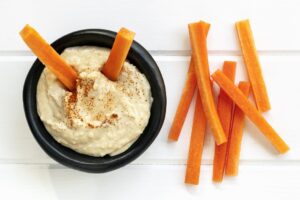
Carrots are a significant source of several crucial nutrients. Even better, there isn’t just one way to eat them. They are convenient and versatile; you could pull them straight from the ground, wash them, and eat them if you wanted to. You could also peel them and cut them up, slice, dice, add to foods, or even juice. They’re even great cooked.
They offer a range of nutrients, including B vitamins, vitamin K and potassium, but it’s vitamin A may be the biggest benefit. Vitamin A helps support the immune system, heart, lungs, and perhaps most famously, eye health.
British propaganda in the World War II era insinuated that carrots (vitamin A) improved eyesight, but it does not. That said, a deficiency in vitamin A can lead to night blindness.
There are two forms of vitamin A: preformed and provitamin A. Preformed is found in animal foods like dairy and meat. When taken in excess, like in supplements, it can be toxic.
Provitamin A comes from plant-based chemicals called carotenoids. Not all carotenoids can be converted into vitamin A, but orange carrots are loaded with some that do, like alpha and beta carotene. One regular raw carrot (2 oz. or 60 grams) has about 75 percent of the vitamin A needed for an adult woman and 56 percent for an adult man.
Carrots are also available in various colours and have slightly different nutrient profiles. Purple carrots have anthocyanin, which is linked to better gut health, improved cognition, and heart health.
Yellow carrots have lutein, which may help with vision and brain health. Red carrots contain lycopene, like red tomatoes and watermelon, which may help reduce stroke risk.
Whether you eat carrots raw or cooked, fresh or frozen, all the nutrients will be there. There is one caveat: if you’re eating raw carrots, you’ll want to have them with a fat source. If not, you’ll miss out on the benefits of carotenoids. So, put olive oil on your salad, peanut butter in your smoothies, meat in your stew, or dip them in hummus for a snack.